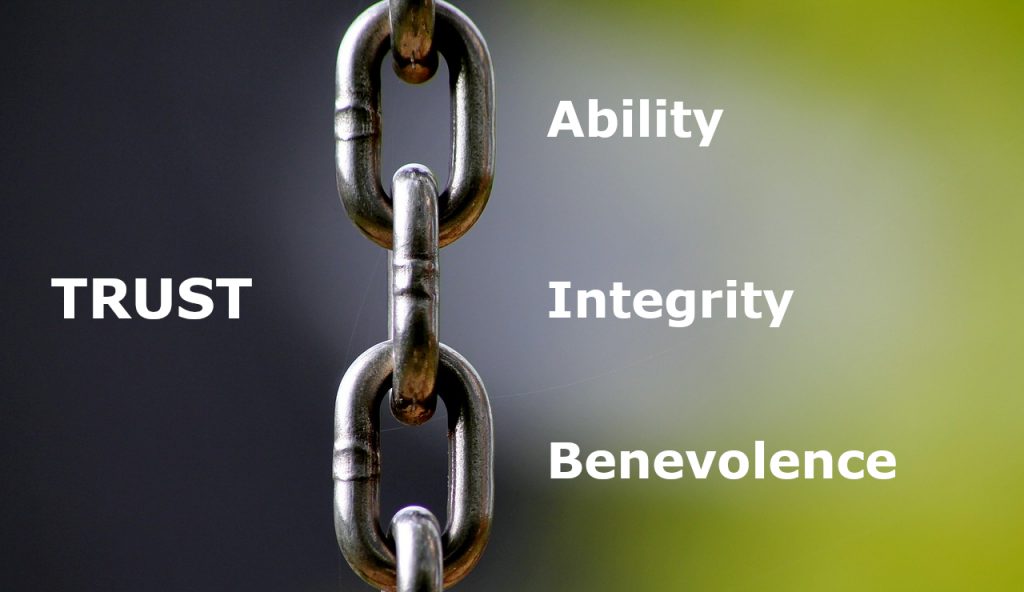Trust has always been a cornerstone to business success, and it has typically been developed through a personal contact with another person, organisation or brand. In this signal post we explore the importance of trust in the platform economy, where digitalisation provides a very different setting with new opportunities and threats. We use the well-established frame pieced together by Mayer et al. that views trust through its three components: ability, integrity and benevolence.

In the next sections we explain the three in the context of platforms and present some topical examples of trust problems and solutions. We focus on the viewpoint, where the user is the trustor and the platform is the trustee. However, it should be noted that these roles can also be studied in reverse, the user being the trustee and the platform the trustor. Furthermore, in platforms the trustor-trustee relationship is, additionally, often formed among two or more users or producers, or between users and producers.
Component 1: Ability
When we talk about trust, ability is the component which explains to what extent we believe that a platform embodies the competences needed to perform its tasks. Ability covers, for example, the technological skills and solutions to deliver the core service as well as preparedness regarding privacy, safety, data protection, etc.
Example: Review and rating systems are a well-established way in the platform economy to check the trustworthiness of platforms as well as their users and producers. Quality of services of all and any parties on supply or demand side can be evaluated, and reports of top performance and misbehaviour spread fast. Of course, even rating systems can be abused, but in practice they have proven very efficient.
Example: Blockchain has been envisioned to improve trust in terms of providing technological means to, for example, validate data integrity. In fact, it can be employed to promote the three factors of digital trust: security, identifiability and traceability.
Example: An important lesson the big platform giants have learnt is that when cyber-attacks happen, it is important to be open about it and inform the users of what happened and how the problem will be fixed. Preventive measures are naturally the top priority, but the user also needs to be able to trust a platform’s ability to react when hackers succeed.
Component 2: Integrity
Using integrity or honesty we assess whether a platform adheres to acceptable principles and keeps the promises it makes. The starting point for integrity is compliance with laws and transparent consistency in following service promises, delivery times, pricing, etc. Extended further, integrity measures how the values of the trustor and trustee (the user and the platform) meet.
Example: Trust can be compromised, when platforms (such as social media companies) collect and sell user data or allow fake news and fake identities in their systems. Even if such activities are legal, the essence of the issue is whether the platform is transparent and informs its users of what goes on and whether it takes an active or passive role in fixing possible problems.
Example: Trust and transparency can be fostered in platforms by engaging the user in the supply chain or sourcing process. For example, it is possible for the user in some platforms to follow their order in real-time and even take part in the decision-making (ingredients used, packaging materials, delivery times, etc.). Again, blockchain technology can be useful in these applications.
Component 3: Benevolence
Benevolence captures the intentions and motivations of a platform and whether these go beyond egocentric profit making. This component of trust blossoms when the user feels appreciated in a win-win relationship, where the value is created and distributed in a fair manner. Benevolence is all about caring, and it is the foundation for customer loyalty.
Example: A pattern we have seen with some of the current platform giants is how they grow from benevolent to predatory. At first such platforms emerge with a low-cost high-value offering, but trust may be compromised as personalised services become a trap, user policies and pricing are changed and the profit-seeking monopoly tightens its grip on both the producers and users.
Selected articles and websites
Afshar Vala, HuffPost Contributor platform: Blockchain: Every Company is at Risk of Being Disrupted by a Trusted Version of Itself.
Baldi Stefan, Munich Business School: Regulation in the Platform Economy: Do We Need a Third Path?
Frier Sarah, Bloomberg: Facebook Says Hackers Stole Detailed Personal Data From 14 Million People.
IBM: IBM Food Trust: trust and transparency in our food.
Kellogg Insight (The Trust Project): Cultivating Trust Is Critical—and Surprisingly Complex.
Mattila, Juri & Seppälä, Timo (7.1.2016). Digital Trust, Platforms, and Policy. ETLA Brief No 42.
Mayer, R., Davis, J., & Schoorman, F. (1995). An Integrative Model of Organizational Trust. The Academy of Management Review, 20(3), 709-734.
Möhlmann Mareike and Geissinger Andrea (2018). Trust in the Sharing Economy: Platform-Mediated Peer Trust. In book: The Cambridge Handbook on Law and Regulation of the Sharing Economy.
Murray Iain: The Platform Economy Can Change the World.
Sangeet Paul Choudary, INSEAD Knowledge: The Dangers of Platform Monopolies.
Sitel Group: No Trust, No Business: Hub Forum 2018 Makes the Future of Commerce Clear.
The Conversation: Social media companies should ditch clickbait, and compete over trustworthiness.
